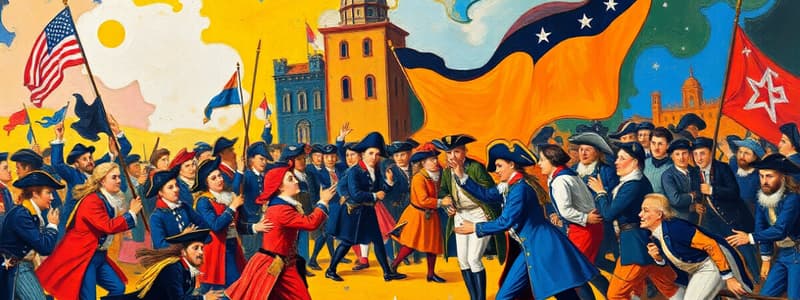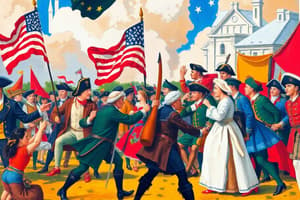Podcast
Questions and Answers
The Revolutionary War began after the Second Continental Congress convened.
The Revolutionary War began after the Second Continental Congress convened.
False (B)
The Articles of Confederation were ratified in 1784.
The Articles of Confederation were ratified in 1784.
False (B)
George Washington ordered Continental soldiers to wear blue coats in 1779.
George Washington ordered Continental soldiers to wear blue coats in 1779.
True (A)
Around 10% of Washington's army were Black soldiers.
Around 10% of Washington's army were Black soldiers.
Two significant battles at the start of the Revolutionary War were the Battles of Lexington and Concord.
Two significant battles at the start of the Revolutionary War were the Battles of Lexington and Concord.
The Continental Army was created on June 14, 1776.
The Continental Army was created on June 14, 1776.
During the Revolutionary War, soldiers in the Continental Army were well-trained and well-equipped.
During the Revolutionary War, soldiers in the Continental Army were well-trained and well-equipped.
The phrase 'no taxation without representation' was a key complaint of the American colonists.
The phrase 'no taxation without representation' was a key complaint of the American colonists.
The Boston Tea Party was an act of protest against taxation without representation.
The Boston Tea Party was an act of protest against taxation without representation.
The statement 'no taxation without representation' criticized British restrictions on trade.
The statement 'no taxation without representation' criticized British restrictions on trade.
The battles of Lexington and Concord marked the beginning of armed conflict in the American War of Independence.
The battles of Lexington and Concord marked the beginning of armed conflict in the American War of Independence.
The British Army had a tactical advantage due to their knowledge of the American terrain.
The British Army had a tactical advantage due to their knowledge of the American terrain.
The Continental Army suffered heavy casualties at the Battle of Bunker Hill, which was a decisive victory for Washington.
The Continental Army suffered heavy casualties at the Battle of Bunker Hill, which was a decisive victory for Washington.
French support during the War of Independence included sending 6,000 troops and disrupting British supply lines.
French support during the War of Independence included sending 6,000 troops and disrupting British supply lines.
General Howe led the British forces that captured Philadelphia, America’s largest city.
General Howe led the British forces that captured Philadelphia, America’s largest city.
Valley Forge served as a location for British troops to regroup and strengthen their forces.
Valley Forge served as a location for British troops to regroup and strengthen their forces.
The First Continental Congress met in 1775 to address the Intolerable Acts.
The First Continental Congress met in 1775 to address the Intolerable Acts.
The Boston Tea Party was a protest against the Tea Act imposed by the British government.
The Boston Tea Party was a protest against the Tea Act imposed by the British government.
The colonies imposed a ban on importing British goods starting on September 10, 1775.
The colonies imposed a ban on importing British goods starting on September 10, 1775.
The phrase 'No taxation without representation' expressed colonial opposition to British taxation policies.
The phrase 'No taxation without representation' expressed colonial opposition to British taxation policies.
The Battle of Lexington and Concord occurred on April 19, 1775, marking the first military engagements of the American Revolutionary War.
The Battle of Lexington and Concord occurred on April 19, 1775, marking the first military engagements of the American Revolutionary War.
The Intolerable Acts were a series of taxes levied on the American colonies.
The Intolerable Acts were a series of taxes levied on the American colonies.
The First Continental Congress had the authority to create laws binding on the colonies.
The First Continental Congress had the authority to create laws binding on the colonies.
Colonial militias, such as the Minutemen, played a crucial role in the resistance against British troops.
Colonial militias, such as the Minutemen, played a crucial role in the resistance against British troops.
Flashcards
First Continental Congress
First Continental Congress
The First Continental Congress was a meeting of delegates from the 13 American colonies in 1774. It was held in response to the Intolerable Acts, a series of measures imposed by the British government after the colonies resisted new taxes.
Intolerable Acts
Intolerable Acts
The Intolerable Acts were a series of laws passed by the British Parliament in 1774 to punish the colonists for their resistance to British rule.
Declaration of Rights
Declaration of Rights
The Declaration of Rights was a document issued by the First Continental Congress in 1774. It affirmed the colonists' loyalty to the British Crown, but disputed the British Parliament's right to tax them without representation.
Articles of Association
Articles of Association
Signup and view all the flashcards
Battle of Lexington
Battle of Lexington
Signup and view all the flashcards
Battle of Concord
Battle of Concord
Signup and view all the flashcards
Battle of Bunker Hill
Battle of Bunker Hill
Signup and view all the flashcards
Siege of Boston
Siege of Boston
Signup and view all the flashcards
Second Continental Congress
Second Continental Congress
Signup and view all the flashcards
Declaration of Independence
Declaration of Independence
Signup and view all the flashcards
General Gage
General Gage
Signup and view all the flashcards
Paul Revere
Paul Revere
Signup and view all the flashcards
Battle of Lexington and Concord
Battle of Lexington and Concord
Signup and view all the flashcards
Continental Army
Continental Army
Signup and view all the flashcards
George Washington
George Washington
Signup and view all the flashcards
Strengths of the Continental Army
Strengths of the Continental Army
Signup and view all the flashcards
British Army's Strengths
British Army's Strengths
Signup and view all the flashcards
British Army's Weaknesses
British Army's Weaknesses
Signup and view all the flashcards
Battle of Boston
Battle of Boston
Signup and view all the flashcards
Battle of Philadelphia
Battle of Philadelphia
Signup and view all the flashcards
Battle of Saratoga
Battle of Saratoga
Signup and view all the flashcards
Valley Forge
Valley Forge
Signup and view all the flashcards
French Assistance in the War
French Assistance in the War
Signup and view all the flashcards
Study Notes
American Revolution Overview
- The American Revolution was a war fought between the 13 American colonies and Great Britain.
- The Continental Congress served as the government from 1774 to 1789.
- Key events included the First Continental Congress, Intolerable Acts, Battles of Lexington and Concord, the Battles of Bunker Hill, and the Declaration of Independence.
- The Second Continental Congress declared American independence from Britain in 1776.
- The war also involved the siege of Yorktown, a key turning point.
- The Continental Army faced challenges such as shortages of supplies, poor training, and disease.
- The British Army, while better trained and equipped, faced difficulties in unfamiliar territory, and resistance from colonists.
- The war ended with the Treaty of Paris, recognizing American independence.
Key Figures
- George Washington: Commander of the Continental Army.
- General Gage: British General.
- Paul Revere: Patriot associated with alerting colonists of British troop movements.
- Baron Von Steuben: Prussian soldier who helped train the Continental Army.
- General Howe: British general leading the army.
- General de Rochambeau: French general who aided the Americans at Yorktown.
- Molly Pitcher: Patriot who assisted soldiers during the war.
- Betsy Ross: credited with sewing the first American flag.
Key Events
- First Continental Congress: Met in 1774 to address the Intolerable Acts.
- Intolerable Acts: Series of laws imposed by the British government after the colonists resisted taxes.
- Battles of Lexington and Concord: Fought in 1775, marking the start of the Revolutionary War.
- Battle of Bunker Hill: Washington’s first battle in which the British inflicted heavy casualties.
- Battle of Boston: The Continental Army won, taking cannons and rifles needed for the war.
- Declaration of Independence: Declared America’s independence on July 4, 1776.
- Battle of Yorktown: The decisive battle where the British surrendered.
- Valley Forge: Washington's winter encampment, noted for hardship and disease (1777-1778).
- Constitutional Convention: Met in 1787 to create the US Constitution.
Key Terms
- Continental Congress: Served as the government during the Revolutionary War.
- Militia: Citizen soldiers.
- Minutemen: Members of the colonial militia.
- Treaty of Paris: Ended the war and recognised American independence.
- Valley Forge: Important winter encampment of the Continental Army.
Studying That Suits You
Use AI to generate personalized quizzes and flashcards to suit your learning preferences.




